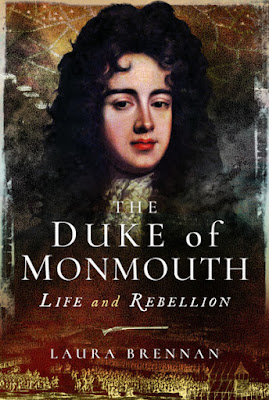Monmouth Rebellion
This post first appeared in March 2021 in my blog A Burnt Ship
Some Associated Poetry
Portrait of the Duke of Monmouth by William Wessing, sometimes spelt 'Wissing' : In the public domain , courtesy of 'Wikipedia'
James Scott Duke of Monmouth was the eldest of the 13 illegitimate children of Charles II. Born on 9th April 1649 in Rotterdam, as a result of Charles' affair with one Lucy Walters ,whilst in exile. He was to play a leading and quite controversial role during the politics of the Restoration as the 'Protestant Duke'. When Charles II died in 1685, Monmouth was living in temporary exile in the Dutch Republic, and the Duke of York ascended the throne as James II. Monmouth launched an ill fated rebellion in the West Country against James II , but was defeated , captured and finally executed on 15th July 1685.
Seems to have been a while since this blog covered anything related to the James Duke of Monmouth: In 2018 I posted about Edmund Waller's poem ' On the Duke of Monmouth's Expedition into Scotland in the Summer Solstice of 1679'.
One of my favourite poems to deal with the Monmouth Rebellion is Charles Causley's 'Ballad of Samuel Sweet' . Born in Cornwall in 1922, Causley served in the Royal Navy during World War 2 . Returned to Cornwall where he became an English teacher and quite well published, poet dying in 2003. The 'Ballad of Samuel Sweet', is set in the aftermath of the Monmouth Rebellion. A narrator, possibly Causley himself, stays in an old house, and gazes out of the window at the peak of a Summer's day. Caught by the white heat of noon, hears the sound of someone running and hoof beats.
One learns that Samuel Sweet is a farmhand, who gives some water to a wounded rebel he finds hiding in the hay. Unfortunately a posse of Royal soldiers appear at that very moment,and harbouring a rebel would be a capital offence. Samuel comes to an agreement with the Royalist captain that his life will be spared if he can run faster than the Captain on his horse. So a race begins, and Samuel outruns them. The captain is so humiliated that he decides to have Samuel hanged in any case. His ghost runs for ever " In the alleys of the air." Due to copyright issues I can not reproduce the poem, but it can be found in Charles Causley 'Collected Poems' 1951-2000.
Recently discovered a 'heroick' poem titled A description of the late rebellion in the West . Described as printed for P.Brooksby at the Golden Ball in Pye Corner , London. Can't work out who it is by. Monmouth is immediately portrayed as a 'traytor ' , the Royal Army are praised . Here are the last few lines. The wretched Monmouth, who is on the run after losing the battle of Sedgemoor, is caught hiding in a ditch ( near Ringwood, Hampshire). Committed to the Tower, then beheaded, the poet has already noted that Monmouth was condemned to death earlier on in the text, so a trial was not needed. The poem portrays the London crowd as celebrating Monmouth's execution, with an ominous refrain "So fell Rebellion and so fall it still/ So fare it with all those that dare Rebel "
A Description of the late rebellion in the West
( Extract)
" On July's Eight MONMOƲTH was likewise found
A very different view of the Monmouth Rebellion is offered by the poet Malcolm Povey, who titled his 2006 anthology ' Sedgemoor' (published by by 'Smokestack Books') to highlight " A crucial but much neglected episode in English history, the last time that ordinary people took up arms against the government." I found the poem After Sedgemoor from said anthology, on line. It looks at the 'Bloody Assizes' and the brutal retribution that the defeated rebels faced, led by the notorious Judge Jeffreys. Some lines are quoted here with the kind permission of the poet and the publisher, but readers are encouraged to follow the link and read the poem in full
After Sedgemoor
"Heads that shouted lustily, 'A Monmouth!'
Limbs that bloodied the Grenadier guards,
Ended up parboiled in bay–salt, cummin seed
..............
So thoughtful, nailed on poles
In the not–yet–pretty villages,
Where now cream teas are served
To tourists keen on heritage.
......
Imagine getting the milk in,
Taking the mail off the postman,
While a large chunk of what was your son
Wafts in the breeze."
Really like the juxtaposition of West Country cream tea tourism. the quaint view of England where one takes the bottled milk in from the doorstep, with the 17th century reality of openly seeing the bodily parts of executed rebels in the aftermath of Sedgemoor. Have since treated myself to a copy of the anthology, hope to post a review in the future.
Further poetry related to the Duke of Monmouth : Hopefully a future post will look at how John Dryden, treated Monmouth, whilst he was the 'Protestant Duke' during the reign of Charles II, most notably in his epic 'Absalom and Achtophel ' . Aphra Behn's play 1682 play 'Romulus and Hersilia' was also an attack on the way Monmouth was acting in opposing James Duke of York being made heir to the throne and his objection to Catholic succession. By way of a contrast, have found that a folk group called Stawhead released an album in 1985 about the rebellion titled 'Sedgemoor' ( now on Youtube) .
Other Blogs by Michael Bully
13th century history (No longer updated).
A Burnt Ship @ Shipburnt
MonmouthRebellion1685@outlook.com



Comments
Post a Comment